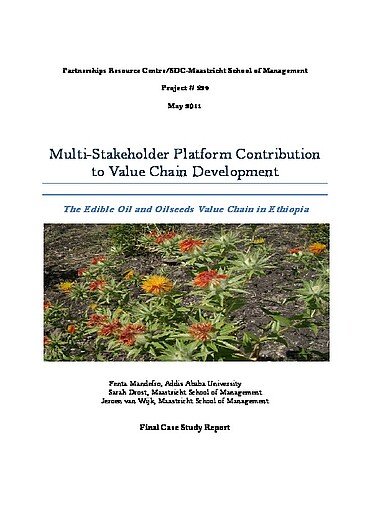Abstract
This report investigates the dynamics of a multi-stakeholder platform (named: Coordination Group, or CG) for stakeholders of the oilseeds and edible oil value chains in Ethiopia. The CG was initiated by the Dutch development organisation SNV in 2005 as part of a broader programme to improve market access for farmers/producers and small - and medium-sized edible oil processing companies. To examine the MSP, both its internal, organisational dynamics and its external dynamics, i.e. the changes brought about in key areas of the institutional business environment, were analysed. A mixedmethod design was used for the data collection and -analysis, including in-depth interviews with 18 key representative edible oil and oilseeds stakeholders participating in the CG meetings, document analysis, and a social network analysis. Ethiopia has a considerable potential for oilseeds production resulting from its diverse and favourable climate conditions as well as the existing large size of uncultivated land. Common and speciality Ethiopian oilseeds (safflower, castor beans and rapeseeds) are under high international demand due to their organic nature. Despite its potential and high international demands, the oilseeds sector in Ethiopia is constrained by several factors that can be grouped into production, processing and marketing problems. The CG was established to address these major problems. The dominant impression is that the CG has played a key role in bringing stakeholders from the three societal sectors (public, private and civil society) together to participate in a new, loose governance structure that reasonably meets the majority of collaboration requirements. Assessments of the success factors in collaboration demonstrate mixed results that range from low-high. Generally, the CG has performed better in the areas of its internal dynamics than in its external dynamics. Despite the fact that oilseeds CG lacks an active nucleus-group; it has introduced and maintained a fairly horizontal discussion structure where each member is free and equal –although related to capacity differences- to influence and contribute to its internal and external dynamics. Lack of active participation of key decision and policy makers in the CG meetings is a limitation of the CG to effectively influence the policy arena. Assessments revealed that the CG was less successful in terms of its external dynamics. Except for its role in creating access to knowledge, the CG performed low in terms of creating favourable institutional business environments for small and medium sized agri-business players. The CG did not influence access to financing mechanisms. Despite its efforts to create international market opportunities, there are few alternative market opportunities created for the oilseeds’ value chain actors in general and for the farmers in particular.
